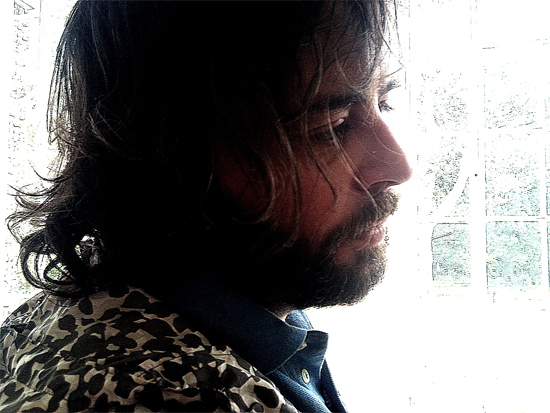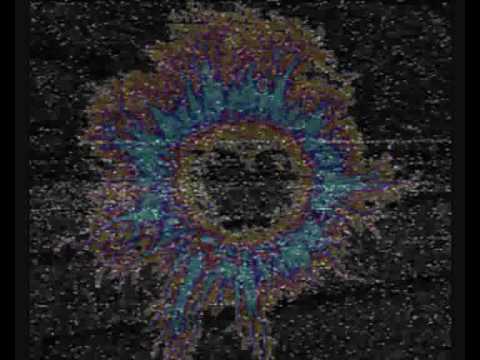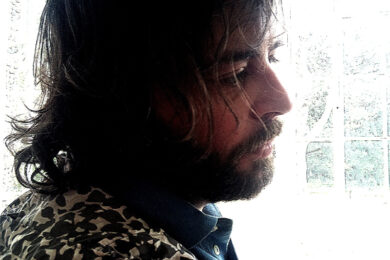"I never did make it to astral projection. Did you?"
Anthony Reynolds has just woken up from his afternoon siesta and, in his own words, is "still emerging from a dream state". His soft Cardiff accent is noticeably crumpled around the edges as we discuss his teenage love for the work of author Colin Wilson, specifically – at that time – Wilson’s many important books on occultism and parapsychology. It turns out that, being of similar age and temperament, both of us in our early teens had attempted astral projection, even arranging to meet like-minded friends on the astral plane. But I have to confess to Anthony that it never really worked out for me.
"No, it didn’t for me, either. But it’s a beautiful time when you do believe all this. There was something precious about thinking it could work, that I never want to let go of, you know?"
Reynolds is probably still best known as the former frontman of nineties band Jack, whose posthumous cult status inches forward with each passing year. But since their dissolution he’s worked on many projects as a musician, singer, writer and journalist, the latest of which is a new album on Rocket Girl, A World of Colin Wilson – though this has in fact been ten years in the making. The album’s genesis was a series of interviews Reynolds recorded with Wilson at the septuagenarian author’s St Austell home between 2002 and 2004, though the finished work is a kind of sound painting in which Wilson’s voice is but one texture, amid electronic sounds ranging from the harsh to the pastoral, treated samples, piano tones, dissonance and echo, and contributions from Martin Carr (Bravecaptain, Boo Radleys) and Spanish post-rock collective La Muneca De Sal.
Wilson is most famous for his first book The Outsider, published in 1956 when he was just 24, and launching him upon the literary scene as one of the original "Angry Young Men" (a term he detested). A Leicester-born, working-class iconoclast, Wilson’s formulation of a "New Existentialism" earned him as much derision as praise, his essential optimism and insistence on self-discipline, as well as his increasingly mystical, visionary tendencies, going against the pessimistic, relativistic trend of the times. Yet he went on to write over a hundred books, covering philosophy, psychology, Fortean history, literature, sexuality, music, wine, and establishing himself as an authority on the occult and serial killers like Jack the Ripper. His many novels encompass science fiction, horror and detective themes, while serving as a vehicle for his continuing explorations of human existence and the nature of reality, and his fans and supporters have included David Bowie and Julian Cope. I asked Anthony what his entry point was into the curious world of Colin Wilson.
"It’s a curious chronology really, because I wonder how many people got into Colin’s work past the age of, say, twenty, maybe," he says. "And that’s not necessarily a criticism of his work, but it was my experience that I discovered it as a teenager, and other people I’ve met, it seems to go hand in hand with adolescence. I think that was part of the appeal of his better work, in the same way that some records – it’s like, I love the group Japan, and what am I, 41 now? And if I meet someone and they say oh I’ve never really listened to Japan, well don’t bother; if you didn’t get them in your teens… it’s rare that you get someone who’s 38 who gets into Japan. There are some artists whose work you have to get within a certain period. You can still be fond of them and it will still speak to you, but there’s an adolescent energy there. Not to say that adolescent energy is something necessarily immature; it is in a way, but there’s a wisdom to being a teenager which goes beyond chronology. So I got into Colin then, when I was about 15 I think, and it just seemed magical; the fact that you could have an out-of-body experience from will, on the astral plane".
So it was his books on the occult that you first encountered?
Anthony Reynolds: The first one I think was called Mysteries. It had a green cover, and it was in the school library. And the idea that I could possibly leave my body and go and spy on this girl that I was in love with, when she was in the bath or something, that was the main attraction probably. But also it was the idea that you didn’t have to be at the mercy of your surroundings and your circumstances. In a very crude way, that was what he was telling me; that you didn’t have to be a victim. I guess a lot of adolescents feel like victims. But I got into him then, and he stayed with me until I moved to London, when I was about 22.
And I remember then getting Adrift in Soho, his novel; it was the first book I bought in London, in 1993, and that spoke to me. He looked cool, too; Uri Geller or Arthur C Clarke never looked cool, but early on Colin had a Bowie-esque vibe. He had cool hair, amazing cheekbones. And then I kind of lost interest really, but by pure chance I missed a train in 2002 and I had to go to a library in Shrewsbury, because I had two hours to kill. And Poetry and Mysticism jumped out at me. Again, it had a great cover; Colin had like a wedge haircut on it. And I just felt like there was unfinished business, really, even though it was ten years since I’d last read anything. So I wrote to him, and I wanted to honour, or pay tribute to, or serve in some way a very particular adolescent that had been touched by his work, if you like.
So it’s a kind of love letter to that 1950s counter-culture and also to your own youth in the mid-80s or whatever…
AR: Yeah it is, it’s about going back and acknowledging that before it’s completely out of your grasp. It’s not so much about a statement of Colin Wilson and his selected works, as it is about me feeling nostalgic for a time that I never lived in. I remember the first time I saw Saturday Night and Sunday Morning, when I was about 19, and I felt very nostalgic for that time, and those characters. And people like Kingsley Amis, Jean Cocteau, these people have been really real to me in my life. Realer than – who’s that cunt?
You’ll have to narrow it down a bit…
AR: No, I mean the arch-cunt, the X Factor guy, what’s his name?
Oh, Simon Cowell.
AR: Yeah. You know, people like him, and this counterfeit human currency that floats through your life. These people who are dead and gone from the fifties are realer and more active, to me, than people who happen to be alive at the same time as me. And I really wanted to connect with that. I remember being at Colin’s house and we were talking about all these people he’d met and I’m like, wow, I’m one handshake away from Henry Miller and Sartre, you know, people like this. He met Camus, he met Marilyn Monroe… I asked him if he met William Burroughs, and he said they were at a party, but they weren’t introduced.
And those people have a real resonance for me, and have just continued to open doors, to this day, throughout my life. And I was able to physically connect with that era, in a way, just through spending time with him. So that was an important aspect to it as well. These aren’t people you meet every day; these are people whose work resonates in some way, whether you like the work or not. So this album is about my feelings about Colin and his work and what it represents, as much as the work itself. I didn’t want to do a kind of Disposable Heroes of Hiphoprisy and William Burroughs album, where you’ve got a guy reading over loops. It’s multi-faceted, the whole record, and it’s about my emotional response to his work as well. And trying to remember what it meant to me when I read it at the library at 15.
Did you go to meet him with the notion that you were going to weave the interviews that you did with him into a piece of music in some way?
AR: No, I don’t think I did. At the time I was living in the country in a very isolated situation. I was in Shropshire, living with loads of animals and my partner, but there were no neighbours, and my musical career such as it was had lost any momentum that it had. I think I just went to visit Colin for the crack of it, really. I didn’t get him on the internet; I had to write, you know, it was letters, and then I think he included his phone number. He still lives in the cottage he moved into in the late fifties in St Austell. Very isolated, full of books. And it wasn’t that thought out really. I just got on the train, it took me about nine hours… but I was recording everything anyway, as I did then, and by the time I visited him the second time I did know that I wanted to present it in a musical medium.
I remember the first time I turned up; I had to make this detour, because I was just getting into cocaine at that time in my life, in the first major way. So I could have gone from Crewe I think, but because I had to score I had to go all the way to bloody Limehouse, and then go to St Austell. And I had an hour between trains to go from Euston to Limehouse, pick up the gear, get back to Paddington… anyway, by the time I arrived at Colin’s house I was ripped. And I remember the immortal line… I mean I was flying, it was a long journey, and I remember it was a big effort for me not to… I was convinced I had to drive the train, the stuff was particularly good. Anyway, I arrived there, and he said "Anthony! Gosh, long journey, but you don’t look tired at all. Do you want to go to bed or do you want to do something?" And I said, let’s write an opera. And he had a piano, but he said "I’m afraid I’m tone deaf." So he’s one of these guys who appreciates music, but isn’t particularly musical himself.
He’s got a famously huge record collection, hasn’t he (about 25,000 albums at the last count, and an equal number of books)?
AR: Yeah; I asked him, what was the first record you played in this house? And he said it was Miles Davis, I can’t remember which one. But I got the sense, although obviously I really love music too, that he kind of enjoyed it in some different way. I don’t know if it’s because he’s not musical per se himself, although I think he wrote a libretto for somebody once, but he’s got no musical pretensions. So when I told him this is probably going to be a record he didn’t say oh, make sure it’s all minor chords or anything. And he didn’t read his work any differently than he would under any circumstances. He just let me get on with it.
Did you ask him to read specific pieces from his work? Did Colin make any suggestions as to what he wanted to read?
AR: I don’t know how familiar you are with his stuff, but you know he’s got a really big bibliography. There’s a lot of books on there that I probably wouldn’t have bought, like World’s Greatest Golfing Massacres Part Two or whatever. I did actually say to him, you’ve written a lot, Colin. I said you’ve written in my opinion four or five really interesting, really fine, probably great books, but would you have written a lot of these other books if, for instance, you’d had a trust fund? Or if you’d had some kind of private income? And he goes, "Oh, would I fuck!" So he has written a lot of books to live, you know, he has got a family, and they weren’t books that I was really interested in. It was the books that had moved me. So it was Adrift in Soho, The Outsider, The Occult, Mysteries, Poetry and Mysticism… it needed to be stuff that spoke to me in some way.
I’ve been re-reading his autobiography, Dreaming to Some Purpose, and it’s clear that he had to work incredibly hard, churning this stuff out just to keep a basic living coming in. That’s one thing that struck me; that even a successful writer of Colin Wilson’s stature has to accept whatever commissions he can get, and knock them out, to some degree.
AR: I was very aware when I went to his home, and it’s a beautiful home, I remember there was a parrot there, there was a dog, there were lots of grandchildren there the first night I arrived, and obviously his lovely wife Joy, but there was very much a sense that this guy was at the middle of all this, he was fuelling it all. He’s done a few books with his son, I think, but he was very much the engine of his life, and that was powered by writing, certainly. And I don’t think many of his books were sold for film adaptations, and there was no way he was going back to a factory. I did get a feeling that he was a very big early success, and that almost set a trap for him in some way.
He talks a lot in his autobiography about the early success of The Outsider being very much a double-edged sword, and how it created a lot of resentment at the time as much as anything else.
AR: Yeah, there was something about that. It’s a bugger when your first work is your most successful as well. But I did get the feeling that he was someone who was under a lot of pressure all his life. And in fact, that he needed that. I did read Dreaming to Some Purpose; he gave me a copy when I came out, and he writes about having a breakdown, because he was just writing 18 hours a day or something. That’s not good. It’s interesting, because I’ve written books as well, and people think writing is to do with the mind, but it’s very physical. I think it’s a misnomer that it’s cushy, that it’s not a real job. And of course Colin came from a classic northern working class background, where this would have been seen as a cissy’s job.
Yes, and famously he didn’t go to university or anything, which was part of the resentment, I think: the fact that he wrote this major philosophical work when very young, and not even with a formal education behind him.
AR: That’s right, I’d forgotten about that. And I think that’s part of his attraction for me, because I never got on with school. I’ve got no qualifications; in fact, I resented any authority figure, but I used to mitch off school to go to the library! Admittedly I probably used to read Melody Maker all day, but still I wasn’t mitching off to go to the bookies or the pub. So in a way Colin suited me. He was a non-academic way of being academic, almost, in a way.
There was also something about Colin that was very pop. I’ve got an early edition of Sex Diary of a Metaphysician, and there’s a great picture of Colin on there. I remember buying that because he looked so cool, he looks like a crooner from the Weimar period or something. And I remember asking his wife, Joy, "Was he a dude when you met him?" and she said "Oh yes, I suppose he was, rather."
I understand Colin has had a stroke since you interviewed him; have you kept in touch? How is he?
AR: That’s really something, actually. I had always kept in touch, but obviously while there’s only one Colin Wilson in my life, there are numerous versions of me in his. You know, people who come and visit him, record him or whatever. But obviously when this was finished I made a bigger effort to get in touch with him, because I thought we could do something live together.
And in fact I got a really moving e-mail from his wife Joy today, because I only recently sent the CD, and she said thank you very much, and Colin wants you to know how happy he is to finally have this in his hands. And she said they put it on, and it has a real meaning for the family to hear him, because he can’t speak now. So to hear him speak as he was when he was last, in the last decade or whatever of his real health, was a very moving thing for them. And in fact his sons and daughter are coming next week and they’re going to listen to it as a family. So that was a really moving thing to hear, for me, and a sad thing that a man who was so erudite – I mean he could really talk, you know, you could really sit down and have a conversation with him. So for him to lose his speaking voice is cruelly ironic.




